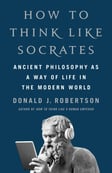Become a Creator today!Start creating today - Share your story with the world!
Start for free
00:00:00
00:00:01

Stoicism and Life Coaching
This episode I chat with Benny Voncken, a Stoic, a life coach, and the co-founder of the Via Stoica website and Podcast. He reached out to me saying he’d love to share his experience putting Stoic philosophy into practice because it greatly reduced his anxiety, worries, and helped him deal with problems such as anger and frustration.
Transcript
Introduction of Podcast and Guest
00:00:01
Donald Robertson
Hello, and welcome to Stoicism, Philosophy as a Way of Life. My name is Donald Robertson, and today's guest is Benny Vonkin. Benny is a stoic, a life coach, and the founder of the Vaya Stoica website and podcast. He reached out to me saying he loved to share his experience putting stoic philosophy into practice because it greatly reduced his anxiety, worries, and helped him to deal with problems such as anger and frustration. So, hi, Benny, and welcome to the the podcast.
00:00:31
Benny Voncken
Hey Donald and welcome. Thank you for having me on. It's such a pleasure to talk it to you. and We've had this pleasure in the in the past but now on the other side and I'm just looking forward to having a good conversation.
Benny's Journey to Stoicism
00:00:41
Donald Robertson
Well, let's start with how you first became interested in stoicism.
00:00:46
Benny Voncken
That's a great question. I get you a bet you get it asked a lot as well. And a lot of these things happen with people when they have when they're down on the lucks, when they have a difficult moment in life. And and the same happened to me. I went through, ah my marriage started breaking falling apart and ended up in divorce.
00:01:01
Benny Voncken
I was having trouble with alcohol at that time. So that's usually when you need some guidance, when you need some something to fall back on. And that's what i that's when I kind of rediscovered stoicism, if you will, and found this practical application at first, made sure that I was getting back on tracks. Because I woke up one morning after going out on ah on a on a heavy night of drinking. And I looked in the mirror and I said, this is not going to be my life. This is not where I want to go. I wasn't just happy i wasn't happy where i want to want where I'm heading.
00:01:30
Benny Voncken
So I figured I need something there and that's where I rediscovered some, you know, some, some kind of guidelines, some rules for myself and found stoicism along the way.
00:01:38
Donald Robertson
Do you know who you sound like?
00:01:42
Benny Voncken
No.
00:01:44
Donald Robertson
Stilpole.
00:01:46
Donald Robertson
Have you ever heard it?
00:01:46
Benny Voncken
Stillpo.
00:01:47
Donald Robertson
Yeah, the Megarian philosopher.
00:01:50
Benny Voncken
Yeah. Yeah.
00:01:50
Donald Robertson
hi He was one of the people that Zeno, the founder of Stoicism, studied under originally when he was developing Stoicism. I don't know if you know the story, but he used to drink very heavily and he blew all his money on parties and heavy drinking and stuff like that.
00:02:02
Benny Voncken
Hmm.
00:02:09
Donald Robertson
And one day he wandered, by accident, into a lecture. Oh, no, Polymon, sorry, um but it's not stop, it's Polymon. He was a Platonist. he was he was one of He was also one of the teachers of Zeno.
00:02:25
Donald Robertson
um Paul Ammon drank very heavily and wandered by accident into Plato's Academy and to a lecture by Zeno Crates who was one of the successors of Plato and he he was he sat down and he I think he was drunk right and sat down and listened to this public lecture by the head of Plato's Academy at the time
00:02:35
Benny Voncken
Mm.
00:02:47
Donald Robertson
and it had such a powerful effect on him that he quit drinking and he ended up becoming and the successor of Zenokratis as the head of the Platonic Academy and he was he was one of the teachers of Zeno so there you go like the origins of Stoicism in part are derived from a guy who had a similar experience to you like he ran into problems with alcohol and then had a you know reached a point where he thought i need to stop this like and he embraced philosophy as a way of turning his life around you
00:03:21
Benny Voncken
I'm not sure if I'm going to make it all the way to the head of the you know of a of of philosophical school.
00:03:26
Donald Robertson
can dream big
00:03:26
Benny Voncken
But yeah, yeah, but it' exactly. No, but it did help me in that sense to to overcome it completely. And I'm not sure if I would have learned that lessons while still being drunk, if I would have walked in there, but especially yeah that that morning.
00:03:39
Benny Voncken
And and just just by reading, that really helped me to find. and And I always talk about Epictetus being like kind of a verbal slap in the face.
00:03:47
Donald Robertson
Yeah.
00:03:47
Benny Voncken
that I needed at that moment and ah that really woke me up a lot to to to really take responsibility for my life.
00:03:54
Donald Robertson
And how long ago was this, roughly?
00:03:56
Benny Voncken
This is about six, six and a half years ago.
00:03:59
Donald Robertson
Right.
00:03:59
Benny Voncken
and i've And I fully quit drinking about four years ago. Like after after that moment happened, I'd never really went out really drinking again, but I had a few drinks here or there.
00:04:10
Benny Voncken
But as you grow older and as you drink less and less, it starts to have more of a physical impact on you. So I would get headaches far faster. And I figured my time is far more valuable than feeling bad.
00:04:19
Donald Robertson
Yeah.
00:04:22
Donald Robertson
Yeah. In Scotland, drinking alcohol is the national sport.
00:04:26
Benny Voncken
Yeah.
00:04:26
Donald Robertson
It's kind of like, you know, quite deeply embedded and in the culture. So it's something I was quite familiar with growing up. um But then how long was it before you started to get more involved in and discussing stoicism with other
Teaching Stoicism and Facing Criticism
00:04:41
Donald Robertson
people?
00:04:41
Donald Robertson
And but how long before you set up the website and the podcast and so on?
00:04:45
Benny Voncken
That was fairly quick after that. it First, I saw the practical application of stoicism you know when you start reading Marcus radius and there was some specific quotes that really struck me and it showed me directly and at work to to apply it.
00:04:59
Benny Voncken
But once you start to read it, my head just started filling up with with these i ideas and I had to write them off.
00:04:59
Donald Robertson
Mm hmm.
00:05:05
Benny Voncken
I had to ah you know get them somewhere. And when I write for myself, it tends to go quite erratic.
00:05:11
Benny Voncken
So I figured if I put it online, then it gets more than it it's more structured and I wanted to put it more in ah in a better in a readable way. And one of the other things that I really wanted to work on is dealing with criticism and where better to find criticism than to go law and and online.
00:05:11
Donald Robertson
Yeah, right.
00:05:19
Donald Robertson
Yeah.
00:05:22
Donald Robertson
Mm hmm.
00:05:26
Benny Voncken
I know from your Facebook groups that there's a lot of people out there who try to nitpick everything and that really helped me to deal with the criticism, with the critique, but also to ch turn it into something as a learning method. I now look at when people criticize me, I ask myself, okay, are they right? Where am I wrong? What could I learn? Where are my gaps? And that's really helped me kind of evolve there as well.
00:05:26
Donald Robertson
Yeah.
00:05:48
Donald Robertson
I find like if you, I have a background in training. I used to run a training school a long time ago. And actually, funnily enough, everything that I've done, like cognitive therapy is based ultimately on what used to be called learning theory.
00:06:05
Donald Robertson
and it's a skills-based kind of quasi. So cognitive therapy actually adopts a quasi-educational model of of therapy. And so we gather feedback. Every client that I see in therapy or coaching, at the end of the session, I ask them to rate the session out of 10.
00:06:23
Donald Robertson
in terms of their satisfaction and getting to tell me what they're taking away from it. You know, i what were the pros and cons of things that we did and so on. And then every training course that I've run, I get participants to fill out feedback forms. and um But also if you're a writer.
00:06:39
Donald Robertson
you get these things called reviews of your books on Amazon, Goodreads, and your audiobooks and stuff like that. So I guess throughout life, I've kind of been inundated with feedback. like And I had some involvement in research and e-learning where we gather a lot of feedback as well. I think I find the feedback that you get for books and things like that, are um stuff that you you create more, a bit more useful i than the the comments that people post on on social media. um For some reason, I think often the discussions on social media and can be, um I don't know, I don't feel like they're as informed sometimes. Like they can be, there's bit there's good ones and bad ones, but overall I kind of think the feedback you get and from book reviews and things is like a lot bit more interesting.
00:07:34
Donald Robertson
But you have to learn, you know, what always interested me is that there are actors and authors who say they never read any reviews and they go, the the best advice I can give you is never read the reviews and stuff like that. I always thought that was terrible advice, you know, because we can learn a lot from feedback and you just have to develop a thicker skin to be able to benefit from it, basically.
00:07:59
Benny Voncken
Yeah, and also that that what Marcus really says, you you choose whether it's going to harm you. And if you read it as words and as something that is just an opinion from someone else, you can then choose, OK, what is really true about this?
00:08:05
Donald Robertson
yeah
00:08:11
Benny Voncken
Is there some validity in what they're saying? Because that's where I really like you have that dinner crooning effect where you start learning something, you're super confident about something and then you start to continue and you just realize how little you actually know.
00:08:23
Benny Voncken
And that's what really happened there where people pointed out things and gaps in my knowledge. And that really made me learn more about it. help i At the beginning, I would stay up all night and read stuff and it's like, oh, where are they wrong?
00:08:34
Donald Robertson
Yeah. Yeah.
00:08:34
Benny Voncken
And at one point you kind of let that go. But I do agree. Like you have to face that critique. That's just the world we live in. And people have a different opinion.
00:08:42
Donald Robertson
yeah
00:08:42
Benny Voncken
And that's great. And I think that that's also where what you see in these with the different kinds of stoic streams that we have where people tend to lock themselves in a little cage and are not able to review other insights on the philosophy.
00:08:47
Donald Robertson
Yeah.
00:08:56
Benny Voncken
That's where you can go into a more dogmatic and maybe even dangerous stream of a philosophy and lose the philosophical aspect of the entire scene.
00:09:01
Donald Robertson
Yeah. Yeah.
00:09:06
Donald Robertson
I definitely think there are people who talk about stoicism, actually, about any subject, but but in particular stoicism, there are people who talk about it that I i can ah feel I can tell they've not really engaged in much back and forth dialectical discussion about the things that they're saying.
00:09:20
Benny Voncken
Yeah.
00:09:24
Donald Robertson
you know and that's in a way that's more like what the sophists did they're just kind of like talking about stoicism but not really discussing it you know and knocking the rough edges off of some of their ideas or learning how to defend some of the things that they're saying spotting the weaknesses in their argument you only really get that that's why Socrates thought um One of the main things like we can take away from Socrates is that he he took the Athenian youth from sitting listening to lectures or watching YouTube videos all day to actually engaging in dialectic ah with each other like in a much more dynamic and interactive way and i yeah I think that's really
00:10:07
Donald Robertson
ah have important to to learning any type of philosophy, including stoicism. But I was going to a ask you, why why do you feel stoicism is still important
Relevance of Stoicism Today
00:10:20
Donald Robertson
today? You got some benefit from it yourself. You know, Ellie, what made it so valuable to you and why do you think it's important to other people?
00:10:29
Benny Voncken
First of all, it spoke to me in a very direct way as I read more, especially Epictetus, it really like hit home. I think and people say this, I never knew I was a stoic, but I've lived very much in the same way all my life. People call me very level headed. So when I started reading about this, it just felt like me.
00:10:46
Benny Voncken
So that's my personal experience with it.
00:10:46
Donald Robertson
Mmhmm. Mmhmm.
00:10:48
Benny Voncken
And and when when we've discussed this, and when we talk about like all the resurgence of stoicism, sometimes I wonder whether it's actual stoic philosophy that's making a resurgence, or whether it's the label of stoicism that people use to give themselves some benefit.
00:11:00
Donald Robertson
Yeah.
00:11:01
Benny Voncken
But I think it's the the real relevancy now is, as we've seen, and you talked about this as well, about cognitive behavioral therapy, they they knew something more about the human psyche.
00:11:11
Benny Voncken
They knew what was ticking.
00:11:12
Donald Robertson
Yeah.
00:11:13
Benny Voncken
Because you can read the the text, the ancient text, and put them, you know, change Rome to to New York or wherever, and they still are valuable and they're still irrelevant. We are dealing with the same human condition and aspects that they dealt with then as well.
00:11:28
Donald Robertson
Yeah, I've always said that I think the popularizing of Stoicism is overall a good thing. But in recent years, I've started to see more of some of the issues. I think it's become more problematic as it's become more popular. And one thing I will note is that I've seen, not over the past five or 10 years, I've seen more people writing about Stoicism and talking about Stoicism who tell me that they have never read the Stoics.
00:11:57
Donald Robertson
you know and to me that should be kind of shocking you know but there are a lot of people that don't think it's a big deal so they get their knowledge of stoicism from listening to podcasts or reading blog articles they've never read Marcus Aurelius or Seneca or Epictetus but they and but they'll make videos and they'll talk about it and stuff and so sometimes because it's sort of third-hand knowledge then you get and a very kind of diluted and sometimes such a distorted version of stoicism that it drifts further and further away from what the original philosophy was like and in in some cases is the complete opposite. I'll give a specific example, and rotate.
00:12:35
Donald Robertson
has a video where he talks about how he's influenced by Marx Aurelius and Stoicism and what he goes on to say about it. He doesn't give any indication that he's ever actually read the Stoics. He doesn't really refer to them. um He talks more about his own ideas and labels them as stoic. um And the way that he describes dealing with emotions is almost is quite contrary to what Stoicism actually teaches.
00:13:00
Benny Voncken
And like that is exactly that label that people use, right? They just say, oh, look, and I'm a stoic, especially in that masculinity scene.
00:13:04
Donald Robertson
Yeah.
00:13:06
Benny Voncken
It feels like this, this maybe even a shield. I feel like and when we talk about someone like Andrew Tate, but it for me, it just oozes insecurity. When I hear people talk about stoicism in that way, they're they're hiding or they're trying to protect themselves from who they really are.
00:13:23
Benny Voncken
And the Stoics really want to delve into who you are, right? They they have that Socratic. They they see Socrates as they're they're you know one of their most inspiration inspirational people. And he's really keen on, like, who are you?
00:13:34
Donald Robertson
Yeah.
00:13:36
Benny Voncken
And that's the crux of it. And some of these things, like, you've talked about Jordan Peterson with the 12 Steps. there is some ben like i had a When I started dealing with my divorce and and getting alcohol, better grip, I made some rules for myself to to get in shape, to better practice, and be who I am.
00:13:52
Benny Voncken
um and to to read more and and and eat healthier and get my physic physique in in my behavior, right? Get that better on the control. But then it's that next step that I feel that a lot of people are forgetting to really delve into something and to really go and figure out why are these issues happening?
00:14:09
Benny Voncken
What's going on here? And I think that that's something that people brush over. They want to have that quick fix.
00:14:14
Benny Voncken
They want to have something that is instant that they can apply. But that's not what stoicism ah is about.
00:14:14
Donald Robertson
Right.
00:14:18
Donald Robertson
Yeah. Yeah. Even in cognitive therapy, which has a lot in common, so it's not the same thing, it still doesn't but it has quite a lot in common with stoicism and is to some extent inspired by it. The first step in cognitive therapy is usually what we call in part of conceptualization or the formulation. This is a jargon terms that we use in in clinical practice.
00:14:41
Donald Robertson
And the conceptualization is when we take what research tells us ah about how emotions work and how the mind works. And we try and translate that into terms that the client will understand and that applies to their problem. The point being that clients don't understand certain things about how anxiety and anger and depression actually function.
00:15:04
Donald Robertson
and it's by teaching them stuff that we've learned from research so that we can give people a more informed understanding. Now the ancient stories did that in their own way. The story the ancient stories had a theory of psychopathology. It was based on a cognitive understanding of emotion. but One of the biggest problems is that when people talk about Stoicism today and they're just trying to take techniques from it, they usually don't understand what the Stoics took emotions to be.
00:15:30
Donald Robertson
you know you need to You need to kind of understand that for the Stoics, emotions are based on beliefs in order for the techniques to kind of make sense. Basically, like if you you know if you take the the techniques out of that context, then they're different. but They don't work in the same way. um And when people don't read the Stoics or they're not interested in the philosophy, one of the main things that they miss why is this like innovative by understanding of how our mind works and how our emotions work. So that leads me on to the next question pretty neatly, which is how do you see the value of stoicism in relation to life coaching?
Stoic Life Coaching Methods
00:16:10
Benny Voncken
That's something that we've been, like I started as a life coach before, while I was doing my work on stoicism, this was all during COVID. I was a teacher before and I feel like there's a lot of coaching elements as as a teacher because you're not just imparting knowledge, also learning who the students are and how to do that the best way possible.
00:16:24
Donald Robertson
Yeah.
00:16:28
Benny Voncken
And for me, there's a two part look at that as ah as a as someone who practices stoicism in their life, I can apply it, I can be be a better coach for the people who I work with.
00:16:38
Benny Voncken
because i can I can be more objective. I really close that hour for that patient for the click for the client just to pay my attention to them fully. and i just used So that helps me as a coach and I can also look from the stoic practices and how I've applied that to myself to really evaluate what they might be what they might be saying or where I need to go and ask questions.
00:17:00
Benny Voncken
And something that I think is important that i'm not I'm not here to turn people into stoics. That's something that I've always said. I think a lot of people are out there, you've got to do this, you've got to practice these things, you've got to be more stoic. or But for me, something that we could really use is more philosophy of life in people's lives, that they start thinking about themselves, that they're asking themselves, why? What are my priorities? What are my values? That's far more important.
00:17:24
Benny Voncken
So when we apply that to to stoic coaching, it is first, it could be a little jumpstart and more knowledge about stoicism, where to start, what to read, how to really apply and and delve into the philosophy as you just expressed in a deeper way, in a more profound way and to see what it's actually about, but also to give those techniques and apply them in the right way and to ask those questions of like, why is this important?
00:17:47
Benny Voncken
And let's see how we can then manifest that. And also to turn the emotions, I see them as a great source of ah of information.
00:17:54
Donald Robertson
Uh-huh.
00:17:55
Benny Voncken
We often give that element of negative, right? Especially on the men. We can't talk about our emotions. But if we turn it into a source of information, why am I getting angry? angry Instead of saying, oh, I'm angry, let me just use that as as you know what Andrew Tate says. let me Let me use that to go to the gym. There's so many things we can talk about there. but If we turn anger into an source of information and we can apply that pause to it, we can say, okay, let me just really evaluate what has happened here.
00:18:20
Benny Voncken
you Let me see what the trigger was that already takes this thing out of it. So that's kind of what we, how does our stoic coaching helps add something more to life coaching in general.
00:18:29
Donald Robertson
Yeah.
00:18:31
Donald Robertson
Do you think anger can also be a source of misinformation?
00:18:36
Benny Voncken
Yeah, but that's how you but any kind of information can be can be ah can be looked at from all different angles, right?
00:18:40
Donald Robertson
Yeah.
00:18:44
Benny Voncken
So even misinformation can be information, but that's why having some support or having a guide or a coach could help you read that information in a better, more objective way.
00:18:52
Donald Robertson
Yeah. Well, that raises a good question. what do Why do people need a coach? and know Why can't they just do self-help? I think that's a really interesting question. of you know Let's break down to basics, right? why What does a coach add? What does a life coach add that people can't just do on their own like by reading self-improvement books and watching videos and stuff?
00:19:16
Benny Voncken
I think that's part of accountability. like You can read all the self-help books and even go all the coaching that you want, but if you don't do anything about it, then there's no real value in it. But what I've got a lot of the feedback is that um I help people look at their own life from a different aspect, from a different angle, just to give them that different view and ask questions that they might not have thought about. And maybe even they come with a certain issue a problem that they want to look into. And after a session, they look at something completely different. So for me, it is really that just putting a mirror in front of them. And that's why it's also important as a coach to remove yourself from it. I've oftentimes have had like, Oh, but why are you saying this is wrong? And I was like, No, this is their view. This is their opinion. This is their
00:20:00
Benny Voncken
a view of life. Let me challenge that. Let me ask those questions and see if we can find the truth of what's really going on. So if you can do it by yourself, I think there are people who can by reading the books and sitting there. And I've i've i've pretty much done that. I've had some people and friends and and coaches that helped me. But I'm sure that people can do it. But a lot of people want that extra guide and maybe some reassurance that someone can can help them in that way.
00:20:25
Donald Robertson
Okay, here's a, let me ask you a contract a more controversial question then that relates to the same point.
00:20:33
Donald Robertson
i We live in an era when people are inundated with self-help and self-improvement material. Okay, I'm old enough to remember when I was a kid, there were like a few self-help books in the bookstore. Now there are many more and the internet is absolutely awash with self-improvement influencers. So we are consuming far, far more self-improvement advice than we did say 30 years ago or so.
00:21:07
Donald Robertson
But I don't think it's necessarily accompanied by tangible improvements among the people are consuming it. It's certainly the level, the amount, the volume of self-improvement content that people consume is disproportionate to the improvements that they seem to exhibit. um So what, I think there are problems with self-help.
Limitations of Self-Help
00:21:31
Donald Robertson
You know, I think there might be several. And, you know, I wonder what they are. Like there could be different ways of looking at it. Why don't people get more but benefit from self-help?
00:21:42
Benny Voncken
I think one of the things is the false promises that a lot of these self-help books project. Like, for example, the 12 Rules of Jordan Peterson, which kind of incline implies that after these 12 rules, your life is going to be great.
00:21:54
Benny Voncken
So we just have to apply these 12 rules and that's it. And there's so much more to it. And there's a, I think, something kind of brewing in a society where people want to put the blame on other people, where they kind of lack taking responsibility for their own life.
00:21:54
Donald Robertson
Mm hmm.
00:22:08
Benny Voncken
So if something doesn't work, then I'm going to go to the next book, because this one didn't work.
00:22:12
Donald Robertson
Right.
00:22:12
Benny Voncken
And that that's where that that agency that people really tend to need to take on their own lives is is lacking, in my opinion, and where the self help book really lacks in that that and output.
00:22:16
Donald Robertson
Yeah. Right. Do you think it's possible that if people are trying to help themselves, like if their thinking is distorted and the ah they have blind spots,
00:22:35
Donald Robertson
that it's gonna be difficult for them to identify the type of self-help that they need. and you know You'd have to be thinking clearly and have self-awareness and objectivity in order to know in the first place how to help yourself. That's one reason why I think that a coach like you add something that you said you can bring an external perspective and hold a mirror up to people. they can't People can't see themselves that clearly. We all have blind spots unless somebody else. you know You might be working with a client and help them to realize that they've got a problem with anger.
00:23:08
Donald Robertson
For example, and I picked that because actually, you know, many people that consume self-help today tend to focus on improving their self-discipline, improving their self-confidence, but they often neglect to work on their anger and their personal skills, you know. And so sometimes you can see that they seem to actually be getting worse in that regard because they they kind of have a blind spot for it and they do it now to begin working on it. But a therapist or a coach can help them become more aware of issues that they previously overlooked.
00:23:37
Benny Voncken
and And I think that's why the the Socratic method is so important to be more reintroduced. It's it's crazy to see how little um um um a little of the importance that gets in the world. We talk about stoicism, but really the Socratic method really ah and implies you to look into who you are, right? And that's where that, because a lot of the self-help book, they scratch those superficial issues that people deal with.
00:24:00
Benny Voncken
But they don't go deeper. And as you talked about, yeah, you have these blind spots, you have these things that you might not see yourself. And that's where an external person, a coach, maybe family member or a mentor or someone like that can really help you.
00:24:10
Donald Robertson
Mm hmm. Mm hmm.
00:24:13
Benny Voncken
But if if you really want to do that self help, then you're going to do what Socrates did, right? He's going to go around and ask, OK, what's what do what don't I know? Where's the lack of knowledge? What is the truth? And if you focus that on yourself, then you will start to reveal those self those those blind spots and those things because you're getting input from externals.
00:24:27
Donald Robertson
yeah
00:24:30
Benny Voncken
And I agree, that's where a coach and and and and therapy, all those those different aspects that we have right now can really work together.
00:24:31
Donald Robertson
yeah
00:24:39
Donald Robertson
Do you think another problem with self-help or self-improvement advice might be that by its very nature, it tends to speak in generalizations to people? So John Peterson would be a convenient example. It's but probably the best-selling self-improvement book. He's like, here are 12 rules way that you can follow. And that kind of one size fits all approach like might be problematic because people that are resilient, ah tended to to we know from research, are typically much more flexible and adaptive in their thinking.
00:25:08
Donald Robertson
They don't usually just have like rigid rules and maxims that they follow. Like one of John Peterson's rules is um always speak the truth or at least never a lie, right?
00:25:17
Benny Voncken
Mm hmm.
00:25:20
Donald Robertson
You know, that's good advice in some situations, but maybe not so much in other situations. Right? And so I think resilience and wisdom would probably consist in being able to know when that's a good idea and when it's not a good idea. And Socrates never gave formulaic advice like that. like He encouraged people actually to spot the exceptions.
00:25:43
Donald Robertson
to their generalisations and to become much more dynamic and flexible in their thinking. So I don't know of how you feel about that, but the impression I get is self-improvement advice that you get online, but it's very in nature, it has to kind of speak in bullet points and generalisations. But you know that does overly simplify things and it can lead to people to follow rules, like sometimes in an overly simplistic and rigid manner. And commonly we we see that's exactly the problem that people are experiencing when they turn up for their initial session in therapy and coaching.
00:26:18
Benny Voncken
I always tend to look at it as like diets. we have we've We've been having like all these different scale right varieties of diets, all out there fasting, ah keto, all of these things. And when I look at a self-help book, it feels like this is a solution that someone found to make their own life better.
00:26:35
Benny Voncken
And people tend, as you said, tend to find it, follow it blindly.
00:26:36
Donald Robertson
Yeah.
00:26:38
Benny Voncken
And the same thing with diets, like this works for me.
00:26:39
Donald Robertson
Yeah.
00:26:41
Benny Voncken
So you've got to go fast. But people forget that life is an exploration of to see what works for us experiment, try these rules, see how they work, where they fail, where they don't, and then try to adapt it to yourself.
00:26:42
Donald Robertson
Yeah. Yeah.
00:26:52
Benny Voncken
Because at the end of the day, these help the self help books are just a guide of how one person helped their own lives.
00:26:52
Donald Robertson
Yeah.
00:26:57
Donald Robertson
Yeah.
00:26:58
Benny Voncken
And that doesn't mean that it's going to help us necessarily.
00:26:58
Donald Robertson
Yeah.
00:27:01
Donald Robertson
Yeah, cognitive therapy actively encourages a kind of experimental attitude like that. Try this and see and then modify it rather than here's a role to follow.
00:27:08
Benny Voncken
Yeah.
00:27:10
Donald Robertson
like And I think you absolutely agree with you. I think often what you get with self-help is people saying, hey, this worked for me. So I reckon you guys should do the same thing. you know And that often leads to this problem of overly rigid roles and overgeneralizations.
00:27:26
Donald Robertson
um Because what works for one person might not work for other people, or it might work sometimes, but not all of the time. So with that in mind, you know what what are some of the ways that you think stoic ideas or techniques can help people in in coaching, like in addition to using the Socratic methods and getting them to evaluate things?
00:27:34
Benny Voncken
a
00:27:44
Donald Robertson
you know There are also i tips and concepts and techniques we can derive from stoicism. What sort of things do you think might be helpful?
00:27:52
Benny Voncken
For me personally, and what I've seen with a lot of people is the apply that pause is that just to give yourself a little moment of time, we always feel like we have to react immediately, especially when we talk about something like anger, we feel like we have to react, you know, instantly, because some injustice has done to us.
00:27:55
Donald Robertson
Yeah.
00:28:00
Donald Robertson
Uh-huh.
00:28:05
Donald Robertson
Yeah.
00:28:06
Benny Voncken
And now that we have this emotion, now we know everything clear, right from that distorted momentary insanity, as what Seneca says, we have to now
00:28:09
Donald Robertson
Uh-huh.
00:28:15
Benny Voncken
move from this directly instead of just allowing ourselves just a little bit of a break, just a little bit of a pause to reflect. And Victor Frankto says that right between impulse and action is that little moment of of ourselves where we can gather ourselves.
00:28:24
Donald Robertson
Yeah.
00:28:29
Benny Voncken
And I think that that's something that people tend to forget and
00:28:31
Donald Robertson
you know Yeah.
00:28:31
Benny Voncken
For me, that's also a benefit of the coaching where I can give them that little pause where I can ask them questions.
00:28:36
Donald Robertson
Yeah. Yeah.
00:28:36
Benny Voncken
Okay, but how are you feeling here? And, and that's where, again, as we talked about the self help, that's where that exploration comes where, okay, how do I apply a pause?
00:28:43
Donald Robertson
yeah
00:28:45
Benny Voncken
Maybe if you're angry, go to the gym, get that energy out and then see how you need to and work away or see what's happening there.
00:28:48
Donald Robertson
yeah
00:28:52
Benny Voncken
Clear your mind a little bit. So that's one of the techniques that I i like.
00:28:55
Donald Robertson
Yeah. How else do you think people outside of the consulting room can learn to introduce a pause?
00:29:03
Benny Voncken
just by, for example, just yeah for going for a walk or for me personally, it helps just taking a deep breath. But that comes with practice, like that pause kind of gets smaller after you practice it more and more.
00:29:14
Benny Voncken
And again, people want to have instant you know instant results there and they say, oh, but this pause is going to take a long time for me.
00:29:16
Donald Robertson
Yeah.
00:29:21
Benny Voncken
But you gotta start practicing it and that's something that people tend to forget.
00:29:24
Donald Robertson
yeah
00:29:25
Benny Voncken
they One of the critiques in stoicism is that it's, look how perfect it all is, right? They're describing the sage, but they forget that it's all about that journey of trying to get as close to that objective as you want instead of getting there already and that's that impatience that people have.
00:29:40
Donald Robertson
How do people know when to pause?
00:29:40
Benny Voncken
So I think
00:29:44
Benny Voncken
that's ah That's also experience and practice. and And I guess that's part of failing a few times, of looking back and of, oh, this is not the right action I should have taken. Where did I go wrong? So identifying those moments where you get that impulse and where you start to act.
00:29:59
Benny Voncken
For example, when and this might be ah you know an exaggerated, but some people get angry to punch a hole in the door and it's like, wait a minute, that hole shouldn't be there. That wasn't good. Where did I go wrong? when did i Maybe when I started making a fist was the moment I started, or maybe when this happened.
00:30:13
Benny Voncken
And as you start to examine that, as we talked before, as you start to examine yourself and
00:30:14
Donald Robertson
Yeah.
00:30:18
Benny Voncken
try to capture that information and remove that disinformation. And then you can start to rebuild those steps and see, okay, maybe this is where I need to pause.
00:30:18
Donald Robertson
Uh-huh.
00:30:24
Donald Robertson
Yes.
00:30:25
Benny Voncken
Or maybe once you start to recognize the trigger and you see that you are, for example, in a in a supermarket the other day, I was in a supermarket and this old lady
00:30:26
Donald Robertson
Right.
00:30:29
Donald Robertson
Yeah.
00:30:34
Benny Voncken
cut in line and I saw it happening and I knew that was going to happen. And before I would have gotten frustrated by it, but now I was already preparing myself and I started just to kind of laugh at it and it's like, let her go.
00:30:39
Donald Robertson
Uh-huh. Uh-huh. Right.
00:30:44
Benny Voncken
So I think that that kind of is is again, the journey where you start to recognize the steps in that process of anger and.
00:30:46
Donald Robertson
Uh-huh.
00:30:51
Donald Robertson
So kind of spotting things at an earlier stage, I think you're you're describing.
00:30:53
Benny Voncken
Yeah.
00:30:54
Donald Robertson
Right, right.
00:30:55
Benny Voncken
Yeah. And then just realizing that, okay, maybe I shouldn't get in this situation at all. And then that negative visualization, that mental preparation comes into mind.
00:31:01
Donald Robertson
Uh-huh.
00:31:04
Benny Voncken
For example, what, what Epictetus says when going to the baths, right? You know you're going to the baths and you're going to encounter all these people. So why get angry at them?
00:31:11
Donald Robertson
yeah
00:31:12
Benny Voncken
Your duty is to stay calm and you can apply that to driving.
00:31:14
Donald Robertson
Yes.
00:31:15
Benny Voncken
If you, before getting in a car, just imagine all the people you're going to meet.
00:31:18
Donald Robertson
yes yeah So if you know that you're entering into what you could call a high risk sat situation or a trigger satu situation, you can prepare for it in advance.
00:31:24
Benny Voncken
Mm-hmm.
00:31:28
Donald Robertson
ah So you're already going into it with a coping mindset rather than allowing yourself to be very reactive to it. Are there any other things that you think we can derive from stoicism ideas or techniques that are particularly useful in life coaching.
00:31:47
Benny Voncken
What I've noticed is that a sense of gratitude building, like we see that that one quote from Epictetus where he says, you know, when you kiss your child, good night whispers, you know, tomorrow you could die. And that sounds ah obviously that cause a kind of morbid connotation, but it's really a sense of knowing what things are.
00:32:03
Donald Robertson
yeah
00:32:04
Benny Voncken
and being grateful while having them. There's a song and and in the in the Netherlands, I'll translate it in English, but it says like, it's better to lose something than have never had it at all.
00:32:12
Benny Voncken
And when you've had something and you've paid attention to it, as Simona Wells said, you know, attention is love, paying attention to something, pure attention is real, like real love to to show an appreciation for something.
00:32:13
Donald Robertson
Uh huh.
00:32:19
Donald Robertson
Yeah.
00:32:25
Benny Voncken
And once you can show people that everything that you have right now is is is you should be grateful for it. You should be able to use it. And but okay, you might lose it at one point, but there's no need of living in fear right now.
00:32:37
Benny Voncken
The same is about dying. Once you live in that constant fear of dying, you're going to forget to live right now.
00:32:43
Donald Robertson
Yeah.
00:32:43
Benny Voncken
So that's what what I tend to help people with when they're coaching, to look at the positive things and to be grateful for everything that you have.
00:32:50
Donald Robertson
Yeah.
00:32:51
Benny Voncken
and create that sense of acceptance there as well, the acceptings that happen. And that's difficult because that's something that you can't really tell people to do.
00:32:54
Donald Robertson
yeah
00:32:58
Benny Voncken
Oh, just accept everything that's happening is fine, but that's the next next step.
00:33:04
Donald Robertson
I think this remark by Epictetus is jarring to a lot of people that when you kiss your child good night, you should whisper to yourself that tomorrow they might die. But to his students, it wouldn't have been shocking at all but because it would have been a very familiar concept in in Greek and Roman society.
00:33:15
Benny Voncken
No.
00:33:21
Donald Robertson
you know similar ideas are attributed to much earlier philosophers and and were kind of quite pretty familiar. like so It wouldn't have been the first time they'd heard something like that. um So they wouldn't have been much more willing to kind of accept. Also infant mortality was way higher.
00:33:37
Donald Robertson
in the ancient world. Marcus Aurelius had 14 children and seven of them died before he did. So the idea that you might potentially lose a child is really much more familiar and commonplace in the ancient world.
00:33:52
Donald Robertson
So in that regard, it's not as shocking as I think it seems to modern readers. The thing about gratitude is very prominent in modern therapy and in positive psychology, obviously.
00:34:00
Benny Voncken
Mm hmm.
00:34:06
Donald Robertson
Marcus Aurelius says something really interesting about it. He says that normally we imagine the presence of things that are absent and that evokes desire. like So I imagine how cool it would be to have a sports car, and which I don't have. like That just makes me crave things that I don't have and experience a sense of privation. But Marcus says we should train ourselves to do the opposite and imagine the things the absence of things that are actually present.
00:34:32
Donald Robertson
So you know I'm sitting inside at the moment with like central heating and air you know air conditioning and stuff like that. There's a blizzard outside. yeah know So if I imagine what it would be like if we didn't have a roof in the building or electricity, it allows me to be more grateful for things that normally I take for granted.
00:34:50
Donald Robertson
These are definitely things I think that can benefit people in in modern coaching, um but specifically one of the other things you mentioned to me previously was a very common problem in coaching psychotherapy is but maybe everyone's favorite problem in a sense is but how do you deal with worry and anxiety and we live in an age of anxiety.
00:35:10
Donald Robertson
you know Because ah politicians politicians love nothing more than anxiety. right they you know they The media love anxiety, they thrive on it. It's like catnip to them.
00:35:26
Donald Robertson
um because when people are really anxious, they pay more attention to the media and to the politicians and stuff throughout history, why that's been the case. So we we actually, we live in an environment where people are trying to make us worried and anxious. um And so it's there's a kind of endemic, i an epidemic, sorry, there's a kind of epidemic of anxiety. What do you think stoicism can teach us about coping with worry?
Managing Anxiety with Stoicism
00:35:55
Benny Voncken
And I fully agree that just news and politics are based on fear. You see that and I'm from the Netherlands. You can see that the politics are there all about fear and just inputting specific items that they know that people and they're not even as big as people think, but because you have one specific example and they help people feed on that.
00:36:04
Donald Robertson
Yeah.
00:36:12
Benny Voncken
And for me, as ah as a coach, I would focus on what really is happening in their life. You know, you you have that putting it into granted perspective, zooming out. But also zooming in is important to see what is around you. Where can you influence you? What influence do you have? And where does your action lie? When I find myself worrying at night for for big things in my life or or just just lying awake with a specific thought, I ask myself, what can I do about it right now?
00:36:38
Benny Voncken
And if you can do something about it, sometimes even if it's three at night, I just do it because why I'm not gonna be able to sleep. So I might as well send that email or do that little thing and I just you know relax because I know I've done everything that I could have done.
00:36:50
Benny Voncken
And that's something where an action, what what I feel from the stoics they say is an action that doesn't lie a lot of worry. We worry about things in the future, things that might've happened in the past, but it's always based on a future result of that we want or desire or something that we wish to avoid.
00:37:05
Donald Robertson
Yeah.
00:37:06
Benny Voncken
But in the present moment, When you're doing something, there's not a lot of room for for for worrying. So and sometimes I tell myself, a night now my action is to sleep because if I want to do my job the best way possible, then I've got to be well rested. It doesn't always work as easy as just saying that, but the practice does help. So focusing on the on the moment, on the present, and on what you need to be doing right now and doing that.
00:37:30
Benny Voncken
to the best but capability of your skills and who you are. That really helps me to reduce your worries. And when we talk about politics, how much can you really influence about all these things?
00:37:40
Benny Voncken
Just focus on the life that you have and try to build that out as best as you can.
00:37:41
Donald Robertson
Yeah.
00:37:45
Donald Robertson
I think the dichotomy of control is really a useful concept in this regard. And maybe also the view from above is a stoic practice that could be helpful, like picturing things.
00:37:56
Donald Robertson
Well, actually, one of the things we know about anxiety is that when people are anxious, they narrow their field of attention down significantly and engage in more selective thinking. So they do what we call threat monitoring.
00:38:07
Donald Robertson
They get really focused on possible signs of danger. And so the opposite of that would be to broaden your perspective spatially and chronologically, actually.
00:38:14
Benny Voncken
Mm hmm.
00:38:15
Donald Robertson
like so one The recommend taking this broader perspective. That's directly contrary to what normally happens when we experience worry and anxiety.
00:38:29
Donald Robertson
But also focusing on the present moment, like you say, anxiety and fear, worry are very much future focused. And so you can't really engage in worry in the same way if your attention is grounded in the present moment. It's inherently antagonistic to it. One of the leading researchers on worry is a guy called Tom Borkovec. And he used to train people to focus their attention on the present moment because of this observation that you can't really worry while you're doing that.
00:38:57
Donald Robertson
But Seneca knows that. But Seneca talks quite explicitly about the same idea.
00:39:02
Benny Voncken
Yeah. and it's and And one other thing is also to to try to prepare yourself for for things that might... i'm I'm the kind of person that if I go to an event, I look for the exits and say, okay, if something happened, I just do a quick mental exercise. If something happens, that's where I can go. And I say, okay, you know, that's fine. And then I can enjoy the rest of it. And just that those are small things that I kind of do. But to have that, if you project a worry,
00:39:24
Benny Voncken
See what you could what the steps might be and how bad does it really happen, right? That's when you get that putting it into broader perspective of the time and the place. But how bad does it really get? And even then, finding that confidence in yourself, maybe thinking back of all the other things that you've worried about and dealt with in a right way.
00:39:42
Benny Voncken
creating that confidence in yourself that when the present moment comes, when it, and I've had so many times, I don't know if you've experienced this, but a lot of times when I'm worried about something, it never really happened. Right? It's like, and now I tell myself, let me first see if this is actually going to happen.
00:39:52
Donald Robertson
Yeah.
00:39:55
Benny Voncken
And when it does, I'll just concentrate and focus on my skills and my abilities at that moment to be able to deal with it in the right way. And that kind of, that kind of helps as well.
00:40:03
Donald Robertson
Yeah.
00:40:05
Donald Robertson
There's research that shows that most of the things that people worry about don't happen. It's really easy to get a bunch of college students to keep a worry diary and then review it at the end of the week and say, okay, write down all the things you're worried about and then end of the week how many of them actually happened or how many of them turned out the way that you were imagining that they would when you were worrying about them.
00:40:12
Benny Voncken
Yeah.
00:40:22
Donald Robertson
Worrying by its very nature involves catastrophizing. why So usually it exaggerates the severity and the probability. And and also perhaps even more importantly, but a lot bit more subtly, when people worry they tend to underestimate their coping ability.
00:40:37
Donald Robertson
like so they kind of imagine that something bad happened they wouldn't know what to do and they'd just be stuck whereas in fact you know they probably have a bunch of options there's probably help that they can get to cope with things you know like they're they're they're not as helpless as lately they normally assume themselves to be um There's something actually in the the way that we, the psychology of worrying, and the chronology of it is peculiar. We usually focus our attention on the worst point in time when we're worrying about an incident. and People don't usually spend as much time visualising what they would do after.
00:41:15
Donald Robertson
Like how, say something really bad happens, like you get fired from your job, like the people who worry about it will kind of focus on the the moment when they get fired and maybe the immediate aftermath, but they don't tend to think as much about the following weeks when they would be recovering from it and moving on.
00:41:31
Donald Robertson
like So again, the the Stoics want to, by getting us to broaden our chronological perspective, you know, that helps to address some of those biases about our coping ability as well.
Understanding and Coping with Anger
00:41:42
Donald Robertson
But I i wanted to kind of talk as well about my favourite subject, which we touched on a little bit already. What do you think the Stoics can teach us a about coping with anger?
00:41:54
Benny Voncken
that's a That's a controversial, you know and we have many conversations about anger. I don't know why and so many people are so defensive when it comes to anger. When you tell people that anger, anger being angry or anger is is a dangerous emotion, people get, no, you can use anger.
00:42:08
Benny Voncken
yous They get like kind of they get become angry when you say, when you mention that.
00:42:12
Donald Robertson
yeah
00:42:12
Benny Voncken
And that that's crazy for me because they, I don't know, I've never had a lot of, ah wasn't it so I don't know, remember I think it was Seneca who said like the the worst plague in humanity has been anger, right?
00:42:23
Benny Voncken
A lot of people, most people have died because people got angry or upset or or or or from those emotions.
00:42:30
Benny Voncken
And when i when when when i look at him when I look at anger from my non-academic mindset, I look at it as ah as a fear that is based in insecurity.
00:42:30
Donald Robertson
Yeah. Yeah.
00:42:35
Donald Robertson
Mm hmm.
00:42:39
Benny Voncken
and and and a sense of injustice. right Something has been done to me that kind of goes opposed to my desires and my wants.
00:42:44
Donald Robertson
Yeah.
00:42:47
Benny Voncken
And one of my coping mechanisms is anger, is that frustration, is that that rage that goes and in in me.
00:42:47
Donald Robertson
yeah Yeah. Yeah. I agree.
00:42:53
Benny Voncken
and And that's where I feel like when we are grounded, when we apply that Socratic method of knowing who we are when we are confident in ourselves that can also reduce our worries because we know that we have the coping mechanisms to deal with what's happening when we are confident about ourselves and we are fearful, then we can apply tap into that courage. Then we can say, okay, I'm fearful of this is going to happen, but I can deal with it.
00:43:16
Benny Voncken
And anger is a lot of that insecurity where we're just trying to mask that and say, like, look at me and and show them I'm more powerful than you.
00:43:19
Donald Robertson
Yeah.
00:43:23
Benny Voncken
And I can deal with, I can, there was one one person said, like, if you step into a room, a meeting room, you should go in there with the attitude that you can kill everybody.
00:43:23
Donald Robertson
Yeah. Yeah.
00:43:32
Benny Voncken
Okay, great. But if there's someone who doesn't mind that, then, you know, they still have a power over you. And you have a power, there's some fear based on that. So I think it's it's it's a crazy way that we really value anger so much.
00:43:40
Donald Robertson
yeah
00:43:45
Donald Robertson
We think of anger usually as an emotion like fear or sadness, but actually the way that you're describing it makes it sound like anger sounds a little bit more like a coping strategy. That's something I'm quite interested in. So, I mean, I wonder to what extent do you think anger is more like a coping strategy perhaps than other ah some other emotions might be?
00:44:06
Benny Voncken
I think that that's a really valid point because you have grief. You can become angry because you are grieving. You can become angry because you're fearful or sad or maybe even, I don't know, from joyful, but you can, ah you know, from those emotions, anger is an outlet.
00:44:12
Donald Robertson
Yeah.
00:44:21
Benny Voncken
Anger is a manifestation of that emotion because you can be, you know, sad when you're grieving, but you can be angry for that loss that you've had. So I do think it is I think it would beg the difference, it would be a great discussion to have whether anger is actually an emotion or whether it is a manifestation of that that outlet of how to deal with that emotion.
00:44:40
Donald Robertson
Yeah, in some ways, it's more like a coping strategy. But as soon as you frame it that way, I think it changes some things. Because if we say it's a coping strategy, it kind of implies that it's a bit more voluntary they you know than people normally assume.
00:44:55
Donald Robertson
um And also, it seems a lot bit more ridiculous if we say it's a coping strategy, because it's not a very good coping strategy usually.
00:45:04
Benny Voncken
And the the problem now is that, especially in the manosphere, um in the manosphere that that people have started using that as a motivation driver.
00:45:09
Donald Robertson
Yeah.
00:45:13
Benny Voncken
So people started to know tap into your motivation.
00:45:14
Donald Robertson
Mm-hmm.
00:45:15
Benny Voncken
So they're actually promoting people to be angry.
00:45:17
Donald Robertson
Yeah.
00:45:18
Benny Voncken
And that's where we start to go into something dangerous. where
00:45:20
Donald Robertson
Yeah.
00:45:21
Benny Voncken
And where you don't have any reason to be angry, you say, no, you've got to man up, me know get angry, and then you can press 500 pounds or whatever. But if that's your motivation to go to the gym, you've got a bigger problem.
00:45:33
Benny Voncken
It's the same as people who who quit alcohol but purely because of willpower. Willpower is like a muscle. And at one point, that muscle is going to flex, and you might fall back into drinking again. But if you do it out of an intrinsic motivation of saying, this is the best for me,
00:45:45
Donald Robertson
Mm-hmm. Yeah. Yeah.
00:45:47
Benny Voncken
If you do the same thing with the gym, if you go to the gym, I want to be physically fit because that helps me be feel better at myself, but also to be more agile, flexible.
00:45:51
Donald Robertson
Mm-hmm.
00:45:56
Benny Voncken
You're going to also be more moderate in the gym.
00:45:57
Donald Robertson
Mm-hmm.
00:45:59
Benny Voncken
I've seen so many people go into the gym and maybe even using some chemical steroids because they want to look buff for whatever reason. Again, they have that exterior posturing that they want to make people think that they are stronger than they might be.
00:46:13
Benny Voncken
But if you do that from the right motivation, you're going to do the right exercises. You're going to apply good nutrition with it. You're going to do everything far better. and You're going to have better results. But if if anger is your motivation, if that's your drive, then you're you're not going to last long on that.
00:46:28
Donald Robertson
It's kind of surprising that people would advocate using anger as well. But even though in a sense it's surprising, it's really common.
00:46:31
Benny Voncken
Yeah.
00:46:34
Donald Robertson
Like something, John Peterson, Andrew Tay, and a lot of these guys actually have that common. You know, Peterson, I don't mean to pick on him, but he's just a very convenient example. He gets really angry in his videos.
00:46:48
Donald Robertson
He's like literally modeling outrage and anger, as well as kind of advocating for channeling it, which is not a thing that we would ever done do in cognitive therapy. you don't it seems very odd. like you know In cognitive therapy we don't yell at the clients and model outrage to them, encourage them to channel their their anger into going to the gym and things like that. One of the problems with that is that both the Stoics and cognitive therapists share the same premise that the anger is cognitive to a large extent. And so if your anger is not just a kind of blob of feeling, um but it's, well, the way I like to explain it to people is clients
00:47:33
Donald Robertson
come into therapy, they'll usually say, hey, I've got this problem with anger, anxiety, depression, whatever. And then they'll talk about how it's messing up their life, destroying their relationship, affecting their performance at work, damaging and the the health, impairing the sleep, affecting the concentration, blah, blah, blah, blah. And so these are all reasons, motivations to change it. and But then usually clients will express stuckness traditionally, they'll go, but I can't help it. Like, it's just the way I feel. I can't do anything about it, right? And Ellis, the founder, one of the pioneers of cognitive therapy, used to lean forward at that point and say to them, yeah, but it's not just how you feel, is it? It's also how you think. Like, you're having angry thoughts and you have angry beliefs as well as angry feelings.
00:48:27
Donald Robertson
right And some of those angry beliefs are irrational, or they're highly selective, or they're based on distortions or exaggerations, or they're even contradictory.
00:48:38
Donald Robertson
Right? And by realising that you can start to change them and modify them. When you change your angry beliefs, then your emotions will change in step with that. Basically, as hundreds of studies in cognitive therapy have demonstrated. But, you know, these guys that say, hey, you should take your anger and go and channel it in the gym, I would ask,
00:49:01
Donald Robertson
What does that do to change the underlying beliefs that made you prone to anger in the first place? How many ah like bench presses do you have to do in order to modify the underlying belief that made you prone to anger?
00:49:20
Benny Voncken
And then how many bench yeah and how many bunch pressure do you need to do to get rid of that anger?
00:49:20
Donald Robertson
I don't think it has. Yeah, it has zero effect.
00:49:27
Benny Voncken
Because then you you know because if that's your if that's your outlet, if that's how you what you need to do. And I think as you that was interesting as you talked about it being a you know way of thinking. I always looked at myself as a victim.
00:49:38
Benny Voncken
And I think a lot of people who are prone to feel that anger and If you really want to sell like if you want to really want to bring good stoic philosophy to the masses, it's not sexy.
00:49:49
Benny Voncken
It's not something that but but anger sells like that's why people like Jordan. That's why you get these viral clips of Jordan Peterson because he's, he's out there yelling and a lot of people who feel that victimhood, they feel anger and they yeah, and they feel they Yeah.
00:49:59
Donald Robertson
yeah You should be angry. You should be angry about cultural Marxists and radical feminists and all these other guys, like, you know, you should be outraged. Like, you should be angry about the fact that other people aren't angry about it.
00:50:12
Benny Voncken
Yeah.
00:50:12
Donald Robertson
Like, that's kind of what they sound like, right?
00:50:14
Donald Robertson
Yeah, they are like, definitely, that that's what they're trying to evoke. It's so out of keeping with what we would normally do in coaching or therapy.
00:50:25
Donald Robertson
um But it's a weird amalgam of politics and self-improvement, which is always ah a surprising combination.
Politics and Self-Improvement
00:50:33
Donald Robertson
why If there's two things that you'd think don't really combine well, like oil and water, it would be political rhetoric and self-improvement.
00:50:43
Benny Voncken
Yeah, because they feed off that that that you know that bringing it out there and showing you the worst sides of it all. like As you we talked about at the beginning, the political rhetoric would bring out fear and the self-help will bring out the things again.
00:50:49
Donald Robertson
Yeah.
00:50:55
Benny Voncken
We live in ah in ah in a society where it's so difficult to make to be seen and heard and people feel irrelevant especially if you are lonely stuck in a room and you have no one to speak to no one hears you in this this this vacuum of of whatever it's easy to go out and shout you want to shout you want to be heard but again that's so so you know again that victimhood mentality plays plays a big part and that's where that
00:51:12
Donald Robertson
Yeah.
00:51:18
Benny Voncken
that self-pity and ah the insecurity really feeds into all of that and they feel the injustice.
00:51:23
Donald Robertson
Yeah.
00:51:24
Benny Voncken
And again, as you said, pointing to specific, ah, feminism, women are the problem. Oh, oh look at yourself, you know point the finger to yourself, hold the mirror in front of you and yeah.
00:51:30
Donald Robertson
Yeah, you guys are the problem. It's someone else that's causing the problem. It's not me. i You're to blame, him right?
00:51:36
Benny Voncken
Yeah.
00:51:38
Donald Robertson
yeah How can you do self-improvement if you don't take any responsibility for your emotions? You just blame them on other people. It's so ironic because but one of Peterson's things is about tidying your room and taking responsibility, but all of his rhetoric is about disowning responsibility and blaming other people for your anger.
00:51:47
Benny Voncken
Hmm.
00:51:53
Donald Robertson
and you your problems. There's a lot of externalization of blame and the political rhetoric that comes into what he's saying is totally contrary to to taking responsibility. Also, in order to take responsibility for your anger, you have to recognize that it's cognitive. You've got to recognize you know your at where your anger is caused by your way of thinking. Then you're taking more responsibility for it.
00:52:15
Donald Robertson
But in Peterson's work and Tate and these other self, they don't recognize the role of cognition. but They don't tend to mention cognitive therapy. i you know they And you know how can you take ownership of responsibility if you don't even recognize what the thinking is that's causing your emotions? um That locks you into disowning and externalizing. But, Benny, I wanted to ask you and a follow-up question based on that.
00:52:44
Donald Robertson
Do you think that anger might be addictive?
00:52:51
Benny Voncken
That's an interesting one and I have to be I do think so because it's a very easy it you know i I don't know the exact naming of all the hormones that it builds up but it gives you a sense of power right it gives people a sense of I'm stronger than you and I can I can kill you and I can do something without you and that gives people and ah the endorphins to feel good about themselves in a certain way for a moment and Yeah,
00:53:02
Donald Robertson
Yeah. Yeah.
00:53:14
Donald Robertson
Psychologists call it the illusion of the illusion of control. It is a company's anger.
00:53:19
Benny Voncken
and that makes sense
00:53:21
Donald Robertson
Yeah. Like it makes you feel more in control of a situation than you actually are.
00:53:28
Donald Robertson
And there are a bunch of reasons why that happens, cognitive. Maybe that's the addictive. there There are several reasons, I think, why it's addictive. Can I quasi-addictive? you know I think that's one of them. It creates an illusion of being more in control. And it does that actually by just limiting your ability to to consider the consequences, ironically. So anger kind of blinds you to the consequences of your actions, right? Afterwards, when you've calmed down, you often regret being angry.
00:53:57
Donald Robertson
because you become more ah able to evaluate the negative consequences. But at the time, we we it literally anger inhibits our ability to picture the consequences of our actions, so especially the longer term consequences. right So that makes us feel more like it makes sense. you know ah because a you know ah If I yell at my wife,
00:54:21
Donald Robertson
you know And I'm incapable in that moment of picturing the fact that she might divorce me tomorrow as a result. I walk out the door. like I'm not thinking that far ahead right because my brain has been switched off like by by the state of the emotion of anger taking over, hijacking my thinking.
00:54:42
Donald Robertson
It would seem obvious to an outsider, like, hey, dude, if you keep yelling at your wife, she's going to leave you. i Seems kind of obvious. But I'm blind to that when I'm in a rage and I don't see the consequences. you know So it makes me feel more powerful than I, it makes me feel like I have more control than I actually do. you know Angry people are actually powerless.
00:55:04
Donald Robertson
you know, because they can't even see that Plato has a really good analogy for it. He said, he compels being a tyrant, which is kind of, let's we can we can say this is similar to anger. um He says people believe that tyrants are very powerful. Angry people believe that they're very powerful. But ah tyrants don't really understand what's in their interest.
00:55:28
Donald Robertson
like They think that being able to kill people and accumulate wealth is what really benefits them, but they they don't really understand the goal of life. And so if you don't understand what's in your own interest, you know how can you possibly be powerful? It would be like if I told you someone had a really sharp sword and they could use it to kill anybody that they want, but they're blindfolded. So they can't see who they're killing. like Would you describe them as powerful?
00:55:56
Donald Robertson
They're very dangerous, but they can't see the consequences of what they're doing. ah Anger is like a blindfolded swordsman. It kind of makes us feel powerful because we've got this weapon in our hands, but we've got no idea what the consequences are or what we're doing because we're blind to it. why with When the red mist descends, we can't think straight. why So we're but no more powerful than a blindfolded swordsman.
00:56:18
Benny Voncken
And then the one with the smallest dagger who is smart and moves in the right ways can easily catch up. And that reminds me did a little bit of that story of the sword of Damocles, where this was a Dionysus the tyrant who has everything and Damocles says like, I want this as well.
00:56:25
Donald Robertson
Yeah. Yeah. Yeah.
00:56:33
Benny Voncken
And he sits him on a throne, gives him everything and hangs a sword above him. He said, now you see how great this is. and if you really have like And that's why Marcus Aurelius is the best example of that it is possible, right that philosopher-king, that if you do it the right way, you can actually make some changes.
00:56:40
Donald Robertson
Huh?
00:56:50
Benny Voncken
It's not going to be easy because he was still fighting off all the political things and everything. but Italian, as you said, it it is powerless because you are at the mercy if the mob, if everybody else joins together, then then there's no one if the fear ends.
00:57:02
Benny Voncken
And I've seen this in with teachers who kind of use fear to to instill the the the classroom in a great fashionable order.
00:57:08
Donald Robertson
Yeah. Oh, yeah.
00:57:10
Benny Voncken
But once the students lose their fear, then you're gone. There's nothing there because that's the only thing that you derived your power from.
00:57:17
Donald Robertson
Angry people are stupid, gullible and easily manipulated. That's why politicians love angry people.
00:57:22
Benny Voncken
Yeah.
00:57:26
Donald Robertson
That's why politicians are surrounded by angry people and like to provoke outrage because when people are outraged, they're easily manipulated.
00:57:38
Donald Robertson
a It makes them easily exploited. Muhammad Ali in the rumble in the jungle when he was fighting George Foreman thought, I can't beat this guy. He's huge. He's like a giant. and But if I get him to lose his temper by taunting him, then he's going to exhaust himself early in the fight. right Angry people, do you think, the I think the part one of the paradoxes of anger Angry people have this sense of strength, and and that's I think that's part of what's going on in the Manaphysphere, is it appeals in particular to adolescent boys, it appeals in particular to people that have problems forming relationships. They feel desperate, they feel depressed, they feel very vulnerable, but anger creates an illusion of empowerment and strength, right?
00:58:27
Donald Robertson
but Ironically, although angry people believe that they're strong and believe anger gives them strength, do you think that angry the opposite might be true? Is it possible that the angrier someone is, the more fragile and vulnerable they become?
00:58:45
Benny Voncken
And I think the more angry someone gets stems from an already insecure and vulnerable state of mind because you want to you want to embellish that to other people.
00:58:50
Donald Robertson
Yeah.
00:58:54
Benny Voncken
Look how strong I am.
00:58:55
Benny Voncken
and i
00:58:55
Donald Robertson
Let me push you.
00:58:56
Donald Robertson
wait When you get angry or does that make you, ah does that actually make you stronger or does it make you weaker and more vulnerable, the angrier you become?
00:59:05
Benny Voncken
and First of all, again, when we talked about it, removes that rational part of you. So that makes you already more vulnerable of of everything that else is happening. Because as you said, you become more gullible, so people can really push you into different directions faster.
00:59:15
Donald Robertson
ah
00:59:19
Benny Voncken
And I think it does amplify all of those those insecurities who are being amplified there. And you just want to show that to to the rest of the world. Like, look at how strong I am.
00:59:29
Benny Voncken
it's ah it's a yeah Yeah, I wouldn't even call it strength. It's just a manifestation of of your weaknesses in a more aggressive way.
00:59:37
Donald Robertson
Yeah. yeah like i mean Angry people are ah like they're blind. like They can't think clearly.
00:59:43
Benny Voncken
you
00:59:44
Donald Robertson
They behave more impulsively. They underestimate the consequences of their actions. They engage more in selective thinking. One of the most interesting pieces of research in anger is that angry people tend to underestimate risk.
00:59:56
Donald Robertson
Anxious people overestimate risk. right So anxious people catastrophize, like they exaggerate probability and severity of threat. Angry people tend to do the opposite and underestimate risk. And one of the main consequences of that is that they get themselves killed more easily. i But even worse, if you're friends with an angry person, they'll get you killed too.
01:00:25
Donald Robertson
Why? Because by underestimating risk, they expose themselves and other people around them to danger.
01:00:34
Benny Voncken
Isn't that the the story that you mentioned and how to think like Socrates with Alcibiades, who at first thought he was doing all these risky things and showing courage while then Socrates said, is that real courage? or and Courage isn't just doing risky things.
01:00:46
Donald Robertson
Yeah.
01:00:46
Benny Voncken
It's knowing what the right thing to do is.
01:00:49
Donald Robertson
Uh-huh.
01:00:49
Benny Voncken
And but if it is dangerous or you if you are fearful, you still do it because you know it's the right thing to do. not just do And this is again with the manosphere and all these things. No, you've got to take risks. No, you have to make it calculated and apply all of your senses to to really do the right thing and then apply courage to it.
01:01:07
Donald Robertson
Yeah, Socrates says, there's a madman who charges at the enemy, courageous or is he just reckless? you know Recklessness is the opposite of courage. like It's based on ignorance rather than knowledge or wisdom. We don't think somebody's courageous. If somebody rushes into a burning house to save a child, we might think that's courageous of them.
01:01:28
Donald Robertson
But if they ah rush into a burning house i to a rescue their collection of Pokemon cards or something, we wouldn't think that's courageous, we just think stupid.
01:01:49
Donald Robertson
You know, we think it's reckless, like they've lost perspective. i but That's also, again, what angry people are like. You know, that their actions kind of don't make sense to external observers.
01:02:01
Donald Robertson
you know And actually, ah angry at people are experts on self-defeating behavior.
01:02:06
Benny Voncken
Mm.
01:02:07
Donald Robertson
like The other thing that's, I think, worth emphasizing, one of the other paradoxes about anger, although angry people feel powerful, they tend to do things, they're experts at achieving the opposite of what they want.
01:02:18
Donald Robertson
But you can only see that by kind of taking a step back. So angry people, for example, would want to to kind of take more control over their relationship with their spouse, you know, the girlfriend or boyfriend. But usually they just end up destroying their relationship and driving other people away, which is the opposite of what they want. Right.
01:02:36
Donald Robertson
So they even though they feel very powerful, they they tend to be more likely to achieve the complete opposite. It's counterproductive. tends to backfire. It's kind of obvious in a way, but that there's a complete lack of awareness of that when we're in the grip of anger usually.
01:02:53
Benny Voncken
And that brings that question like, oh, and how about a little anger? Isn't that, you know, isn't that good just to have a little bit and but, you know, anger can be quite contagious.
01:02:57
Donald Robertson
A little bit of anger. Yeah.
01:03:01
Benny Voncken
And as you said, if you are angry, it can spread out to a lot of people and you can endanger the people around you, the friends and family and or whomever is with you.
01:03:05
Donald Robertson
yeah
01:03:09
Donald Robertson
Yeah.
01:03:10
Benny Voncken
But even a little bit of anger can maybe you're a little bit angry, but then someone else can really fuel have that fuel up. And I think anger is such a volatile state of mind that it's pretty impossible to control.
01:03:18
Donald Robertson
Yeah. I mean. what what like what What if I only underestimate risk and ignore the consequences of my actions a little bit?
01:03:30
Donald Robertson
you know Surely that's okay.
01:03:31
Benny Voncken
Yeah.
01:03:32
Donald Robertson
right so it's when When we understand anger more cognitively, you know what if I'm only a little bit in error? you know it It doesn't make sense to say to say that. But I could channel my ah temporary madness and distorted thinking. No, it doesn't make sense. but If you understand it cognitively in terms of biases and stuff like that and errors of things, it doesn't make sense to say that you have a little bit of it or you're trying to channel it in a positive direction or you're venting it in the gym or whatever. None of that makes any sense.
01:04:02
Donald Robertson
like if we're talking about mistakes that people are making or errors of judgment that they're involved in, and maybe it could be useful. You know, you could get things done politically, like you know anger could give you the motivation to kind of really, you know, ah force change in society. It's one of the main justifications that people normally give for anger, but If anger distorts our thinking and makes us poor judges, um you know having more perseverance, ah pursuing our goals more aggressively, like would seem like a terrible idea.
01:04:41
Donald Robertson
you know i a What sense does it make to say, I'm going to sacrifice some of my intelligence in order to gain more motivation?
01:04:53
Donald Robertson
Doesn't make any sense at all.
01:04:53
Benny Voncken
And.
01:04:54
Donald Robertson
why So you're going to do stupid or things more aggressively. why it's It's not a trade-off that makes any sense at all to me.
01:05:05
Benny Voncken
and and And then when you want to make changes, and if you want to make changes in the right way, doing it again from the right motivations would not require anger, right because you don't need it.
01:05:14
Donald Robertson
Yeah.
01:05:14
Benny Voncken
But if you, as we talked about in the beginning, a smart politician knows that if you create a mob, an angry mob, they will create a change that they want in a certain direction. So if you are part of that angry mob,
01:05:23
Donald Robertson
Yeah.
01:05:25
Benny Voncken
You are just being pushed, you are being manipulated by someone who is using their wits, who is using their, they know exactly what they what they are doing when they are creating anger and fear in the people. And that's where we have to, again, we have to apply our own thinking. We have to question the things. And that's something that we forget to do and we are when we are in an angry state. Because we feel that what we are angry about is the right cause and that's what I'm going to follow. and And anything who anyone who tells me something different, then then I'm just going to be angry at them even more.
01:05:56
Benny Voncken
And that's where we create that cognitive dissonance, right? Where it's like, this is my belief and you try to question it, that's not going to happen.
01:06:01
Donald Robertson
Yeah. Yeah, it's difficult to listen to reason. Everyone knows you know it's difficult to listen to reason when you're angry because it's a so deeply irrational.
01:06:08
Benny Voncken
yeah
01:06:14
Donald Robertson
It's difficult to be objective when we're angry. There's a bunch of things that go on. One of the things that goes on in anger is a dramatic shift in our focus of attention. but we We tend to, when we're angry, with some exceptions, generally speaking, it throws all of our attention outward. So it inherently makes us less reflective. like It's kind of, in some ways, ah it it can sometimes function as a way of distracting ourselves.
01:06:38
Donald Robertson
from our own weaknesses, fallibility. it's complete In a sense, it's it's fundamentally antagonistic to self-improvement, to become very angry or very outraged because it it it turns attention away. It's the opposite of know thyself.
01:06:55
Donald Robertson
When we become angry, we tend to become deeply concerned with blaming other people. And all of our attention tends to be focused outwardly and shifted away from our own self and our own errors of thinking and our own character. We're not focused on the self, so we can't be doing self-help or self-improvement anymore. We think the problem lies with other people.
01:07:22
Donald Robertson
We have to famously, Epic teachers said somebody who's completely ignorant of philosophy blames other people for their problems and somebody who's partially educated in philosophy or stoicism blames themselves. But somebody who's a sage and is completely assimilated stoicism doesn't blame anybody.
01:07:49
Benny Voncken
Yeah, and that's kind of another thing that I think people forget about stoicism is where to put our values and priorities and the stoics that say you have to guard your character and your soul. And if you do that, then if someone steals something from you, you can get angry at them, but they are at fault. They have harmed their character. And i if I act in the right way, if I accept it, right, then I can still preserve my humanity and I can still preserve my my right way of living, my calm state of mind. And that's where we can focus on our own actions and kind of separate it again, that dichotomy of control from what someone else is doing. We can remove that that that, you know, that connectiveness between the action and my own state of mind. And I think that that's something where a lot of people forget about what really is important. We place the values and objects, money, and that's what we become angry about, the power that we lose or some object that we, we we you know, we lose. And that's where we place, again,
01:08:43
Benny Voncken
our our priorities. Well, if we place it in ourselves, then we can start to think about ourselves more that internal work, as you said, that fear that anger is more of an external expression of the emotion. But if we put it internal, then we start to examine things and become that observer. That's another great tool that I've used and seen with other people is to start observing again, that foot that view from above, but we start to observe what's really going on.
01:09:08
Benny Voncken
It would be interesting to create an anger and anger simulation where people would, would be similar would be able to look at themselves being angry. That will be an interesting view of looking at an and then see how do you judge yourself?
01:09:19
Donald Robertson
Uh-huh.
01:09:20
Benny Voncken
How do you look at yourself when being angry? And how do you think you are actually applying your cognizant skills to to to deal with the situation in the best way?
01:09:30
Donald Robertson
yeah Plutarch thinks this is a recurring idea in ancient philosophy that people might literally benefit from looking in mirrors. Supposedly Socrates used to tell his students to buy a mirror, like in practice looking in it. Plutarch says that angry people should train themselves to look in the mirror so that they can actually observe their anger more objectively from an external point of view.
01:09:54
Donald Robertson
Seneca and interestingly talks about that technique but he doesn't think that it's effective when somebody's really outraged but Plutarch thinks that in some situations it could be helpful as we're dealing with anger. I wanted to, I think a ah good place to to conclude would be just to ask you what you think ah is the best way for people to begin learning about Stoicism and applying it in their and the life if they are completely new to the subject.
Getting Started with Stoicism
01:10:22
Donald Robertson
Where should they begin?
01:10:23
Benny Voncken
At what you mentioned, a certain stage of this conversation is to read the ancient texts, to really go into those texts. And I've actually created a a reading list for beginners on on the website where I connected the ancient texts. For example, you could read Marcus Aurelius and then read How to Think Like a Roman Emperor from your side, where you can get the ancient texts and you can get some perspective from from yourself, but also to read Epictetus and read Massimo Piviucci's How to Be a Stoic.
01:10:50
Benny Voncken
or Seneca and breakfast with Seneca. So you can combine those two books where you can get more contemporary look and some techniques and some some ways of you know applying it to your life. I think the application part is so important. So ah it also just identifying something that you want to work on, a part of your life. For example, anger. How do I deal with anger? How do the stoics deal with it? The questions that we've been kind of asking, really focusing on one part and seeing how it applies to your life. So starting with the text, but also just speaking to other people, maybe a coach or maybe some other people in there's, there's so many great people I've met. As I've started going on this journey of stoicism, I met Bryson Brendan, who I now founded via stoic away, I have met them on the spaces. And people talk bad about social media. And but it's what you put in is what you get out. And I think that that's the same thing with love. If you put with life, if you put
01:11:43
Benny Voncken
anger in, then you're going to get it back. But if you put honest, and positive thinking and you really want to improve yourself for the people around you, you're going to find those people who are willing to help you. So I think that those are great ways to start. But I do think that people should read the ancient texts and maybe find a guide if it's difficult for you to really understand and what the value is there. Find some other people who are just a little bit ahead of you but can who can yeah guide you a little bit through the lessons and see where you can apply it.
01:12:13
Donald Robertson
Well, I think that's been another great discussion about Stoicism. So thank you very much for joining me, Benny. We hope that you listeners enjoyed the conversation as much as we did. So please share the link with your friends and subscribe to the Stoicism Philosophy as a Way of Life newsletter on Substack for more podcasts and articles and philosophy and psychology. And thanks for listening. So it's goodbye from me, Donald Robertson, and from my guest, Benny Vonken. Bye, everyone.


















